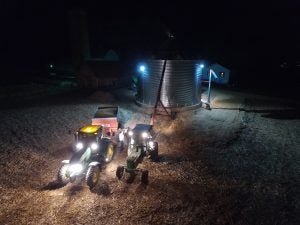Fourth-generation Minnesota farmer CJ Bengtson was in for a surprise when a state trooper pulled him over one night … in his combine. Bengtson tweeted that he thought the trooper was going to give him an escort. Instead she gave him a written warning. The reason? He didn’t have his hazard lights on.
He shared about the incident on Twitter, and even posted a photo of the warning he received from Minnesota State Patrol trooper.
Got pulled over in the combine tonight and also thought the trooper said I’ll follow you but I guess i was wrong and she called in that a suspect was fleeing in his combine, top that #AgTwitter pic.twitter.com/uxMecTEMMH
— CJ Bengtson (@BengtsonFarms) November 2, 2021
As Bengtson mentioned in a follow-up tweet, if the trooper doesn’t have enough to do, maybe she could drive the grain cart. (In all seriousness, combines have a ton of lights on them. I’d be surprised if it wasn’t totally lit up going down the road.)
It reminds me of a story from high school. We were working on public speaking and storytelling in our English class. The assignment was simple: Tell the class an engaging story in the first person. It didn’t have to be a true story.
So I confidently got up in front of the class. I shared how I was riding in the combine with my dad late one night. There was a bunch of rain in the forecast, so we were trying to get as many soybeans off as possible before it started. The field we were working in was adjacent to a subdivision. A homeowner must have called the police to complain about the noise. I groggily woke up to see the police car pull up with his lights flashing. Dad exited the combine to speak with him. The officer asked him to quit for the night and pack it up. Instead Dad told him that he was protected by Michigan’s Right to Farm Act, made a gesture as he climbed back into the combine, and got back to work.
My classmates were horrified because our teacher was — while very sweet — a bit “traditional.” But she literally LOL’d when I finished, and as I took my seat, she tacitly giving the class permission to laugh as well.
Remember: It didn’t have to be a true story. And it wasn’t. At least, I didn’t experience it. I can’t imagine my dad ever behaving that way (as much as he may want to), and most of our neighbors are pretty understanding. We actually heard the tale from another farmer at a local farm bureau event. It’s been a long time, but I can’t imagine that farmer behaving that way either.
It also wasn’t an accurate application of Michigan’s RTFA. As I discovered in law school, the act protects farmers from nuisance lawsuits so long as they’re following Generally Accepted Agricultural and Management Practices, or GAAMPs. GAAMPs are developed by the state’s Department of Agriculture and Rural Development. But it doesn’t protect farmers from noise complaints or even all lawsuits — it only applies to nuisance litigation.

That’s still really important though. As you probably already know, farming doesn’t fit within standard working hours, it’s messy, and it happens out in the open. So Michigan farmers are protected while combining late, running the noisy grain dryer all night, or kicking up dust as they drive past someone’s house. Sorry not sorry, but we’re out here doing a job.
This year actually marks 40 years since Michigan enacted its RTFA. But all 50 states have similar laws, though some are more expansive than others. All of them try to protect the act of farming, which is wholly different from preserving farmland or rural communities.
Right to Farm Laws won’t help you during harvest this year from bored officers (sorry Bengtson!) or annoyed neighbors. But they’re something we take for granted. Dust, noise, and inconvenience doesn’t mesh well with our modern lifestyles and litigious attitudes. So it’s good we’re covered — and that’s a true story.
Amanda Zaluckyj blogs under the name The Farmer’s Daughter USA. Her goal is to promote farmers and tackle the misinformation swirling around the U.S. food industry.



